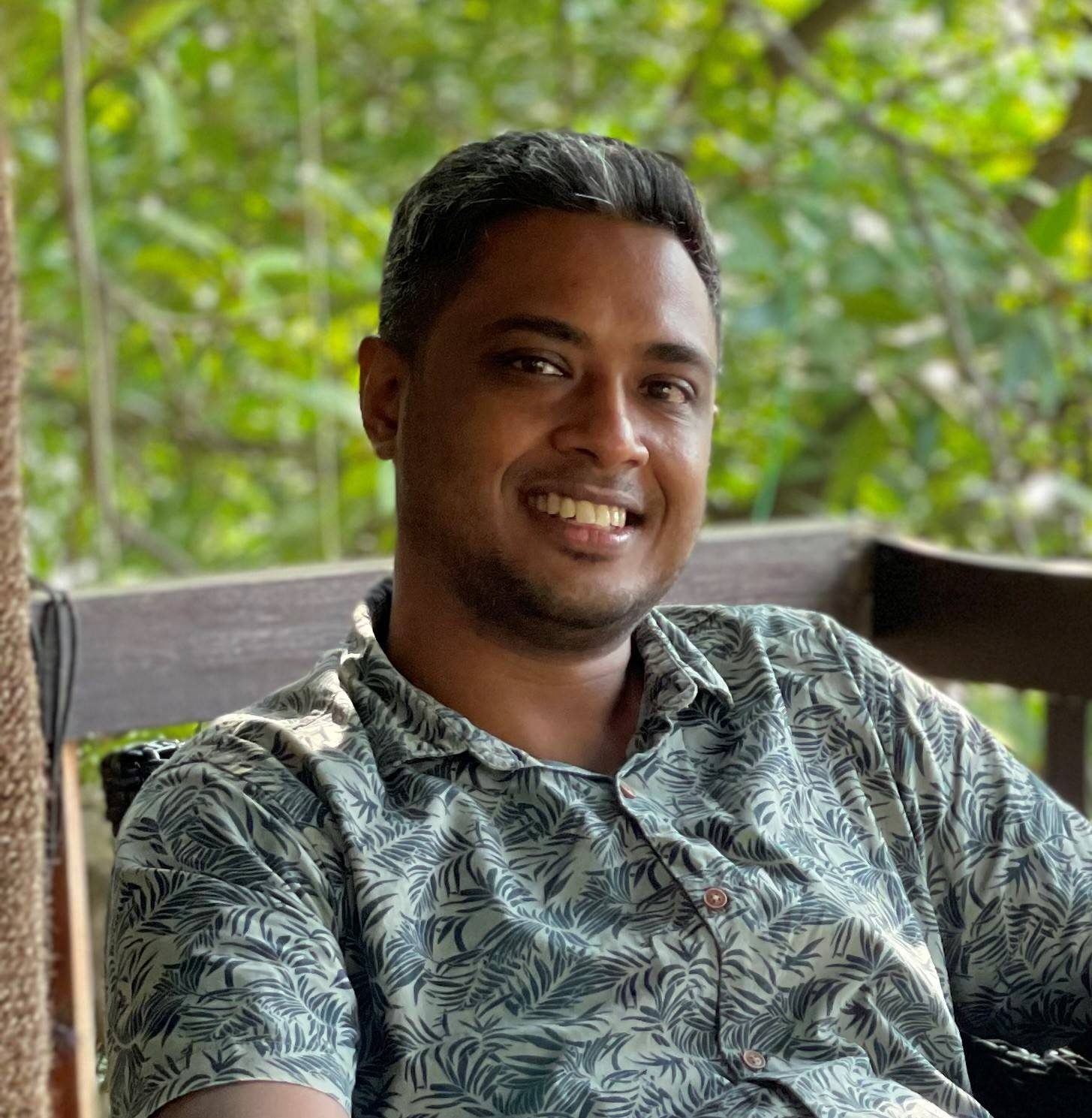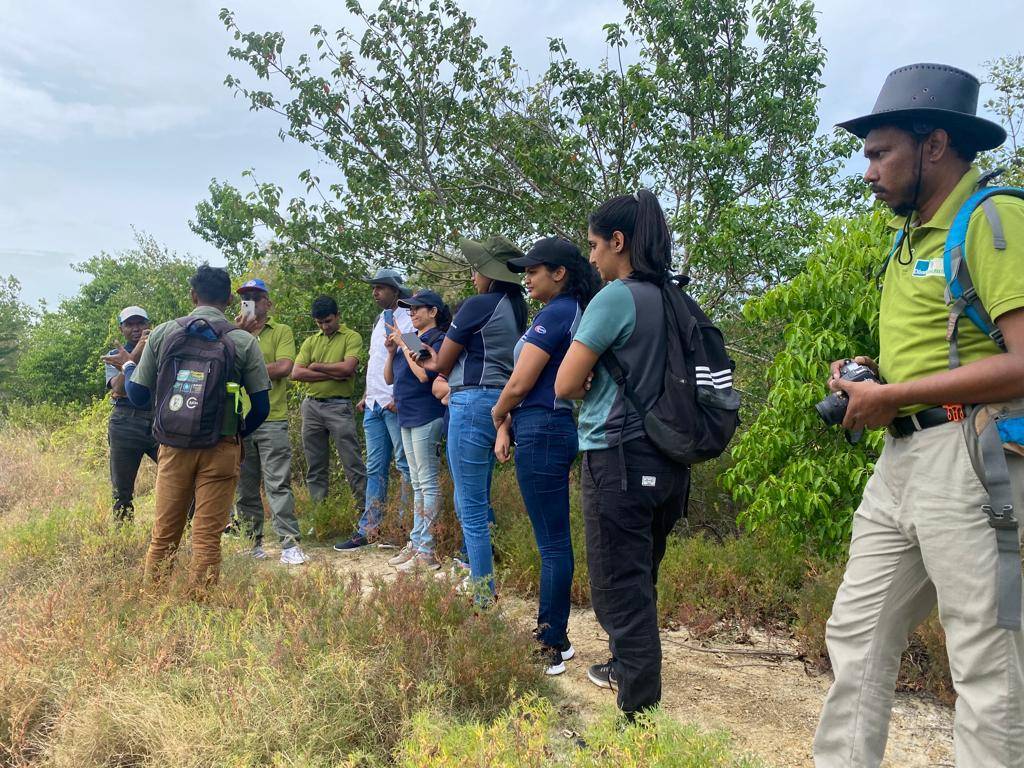
In Conversation
In our “In Conservation” segment this month, we chatted with Mr. Rishard Preena, Head of Sustainability Operations, Aitken Spence Hotels. Rishard is BSL’s focal point for Patron Member Aitken Spence Hotels.
BSL: Can you give us a brief introduction to your company & yourself
A: Aitken Spence Hotels operates a chain of 20 hotels and resorts in Sri Lanka, India, Oman, and the Maldives under three brands: Heritance Hotels and Resorts, Adaaran Resorts, and Turyaa. The portfolio includes 10 properties in Sri Lanka, five in Maldives, four in Oman, and one in India. Each of our unique properties caters to a diverse client base, having hotels suited to every need and budget while maintaining the high standards of hospitality that we are synonymous with.
Located in key tourist locations, the Aitken Spence chain boasts of exotic properties such as the award-winning eco-resort Heritance Kandalama which is situated in close proximity to two UNESCO world heritage sites, and the Desert Nights Camp in Oman, rated as one of the top ten desert retreats in the world. Our distinctive collection of hotels and our reputation for excellence make us a leader in the global hospitality industry.
As Head of Sustainability operations of Aitken Spence Hotels and being an engineer by training and qualification, I work on sustainability, renewable energy, process improvement, CSR, and project management.
BSL: What drives your sustainability agenda and what are the key focus areas?
A: Aitken Spence Hotels is a pioneer in the corporate sustainability movement in Sri Lanka. For us, sustainability is the fundamental practice of ensuring our operations can be sustained in the long term. As a member of a blue-chip conglomerate Aitken Spence PLC, our strategy entails operational priorities of all our subsidiaries under one policy framework to guide them on required action.
Accordingly, we have stipulated action points as ‘must do’ (essential action), ‘should do’ (where specific subsidiaries are expected to take action beyond the basics, based on the nature and scale of the impacts), and ‘could do’ (exemplary action to create differentiation for our businesses through sustainability). As a result of this strategy, we have several environmental management systems and a pool of more than 30 employees trained as internal auditors, Environmental Management Representatives, first-aid officers and fire wardens. Our company maintains over 20 diverse management systems certified under international benchmarks for environmental, quality, product responsibility and social sustainability.

Where else in the world can you stay in a converted tea factory, pluck your own tea and take it home with you as a souvenir? At 2km above sea level, the views over our lush green organic plantations as the sun mingles with the mist are truly unforgettable. Enjoy them as you tuck into high tea on the terrace or a delicious tea-themed menu in the restaurant. Welcome to Heritance Tea Factory, where the kettle is always on.
BSL: Give us an outline of your current sustainability initiatives/ Projects
A: At Aitken Spence Hotels, our efforts are ongoing. For example, we focus on reducing, recycling and reusing solid waste through our 7R initiative with the end goal of zero waste in landfill. We have successfully eliminated several single-use plastic waste streams over the last few years, and our objective is to keep improving.
Other examples include reducing the use of harmful chemicals, focusing on stringent standards on quality, environmental and health impacts and quantities used.
Conserving energy and water; Energy efficiency and use of renewable and alternate energies, such as Solar PV, replacing heavy fuel oils and diesel with Grilicidia / Cinnamon wood in biomass gasifiers and innovative technologies.
Improving our local employment (over 40% of associates are from immediate neighborhoods and villages in which we operate) and increasing opportunities offered to our female associates to enter management through training and skills development.
We also conduct localized programs for clean beaches, increasing green cover through tree planting and stewardship programs and coral growing and reef regeneration initiatives.
BSL: What do you consider are your company’s key achievements in sustainability domain and the reasons behind success?
- Heritance Kandalama – the first LEED certified hotel in the world and the first LEED building outside of the United States
- Heritance Aarah – the first LEED certified property in the Maldives
- The Heritance Hotels and Resorts and Adaaran Resorts chain of properties are certified Travelife Gold
- One of the first corporates to be signatories to the UNWTO Global Code of Ethics for tourism.
- Numerous awards and accolades for Sustainability and Green initiatives
With numerous international awards for high quality cuisine, service excellence, building conservation and environmental care being awarded, our hotels have been recognized as being among the top hotels in Sri Lanka. With over three decades in the hotels industry, our expertise in hotel design, building and management is complemented by our dedication and commitment to excellence in everything we offer. We are proud to be one of the most awarded hotels in Sri Lanka.
BSL: What are the challenges you fore-see in driving the Company’s sustainability agenda forward in the current, extremely volatile business context?
A: Shifting business practices to be more environmentally – friendly and sustainable can be expensive, at least in up-front costs, which makes businesses averse to making changes. It is relatively easy to calculate the savings from moving to renewable energy, but not all sustainability solutions are as straightforward. Changing an entire business supply chain to use more sustainable raw materials, is likely to require a costly initial investment even if it would pay off with time.
Holistically, however, we believe it is our sustainable business model that helped us manage our business during uncertain and unprecedented times in recent years. Therefore, it is key to understand and appreciate that while investment is required to maintain a company’s sustainability stance, the pay-off is in the long run and the stability it creates as a result of best practices in place.
BSL: Any interesting future plans?
A: Our future plans focus on resilience and adaptation, as all businesses must evolve. Whilst plans are many, we as a company believe in action before words. Therefore, we request you to follow us on our journey and be inspired by our passion and commitment.
BSL: Any message/s/ recommendation/s to BSL Members who aspire to be leaders in Corporate Sustainability?
- Move from being change-ready to change-driven
- Become conscious of your own values and purpose
- Empower and uplift each other – as corporates and individuals
- A strong sustainability culture requires transparency and honesty
- Be open to criticism as an opportunity for improvement

“Life to Our Mangroves” – A Partners led Effort
LIFE to Our Mangroves is one of BSL’s landmark multi-partner public-private partnership projects aiming to assist in restoring degraded mangrove patches located in the Anawilundawa Ramsar Wetland Sanctuary. The Anawilundawa Wetland Sanctuary spans over 1,397 hectares and is an amalgamation of forest wetlands like mangrove and freshwater swamps, coastal saltwater ecosystems, and freshwater lakes. It is one of Sri Lanka’s six designated Ramsar Sites.
The selected patches have become degraded due to intensive shrimp farming projects that took place over three decades ago. Led by the Department of Wildlife Conservation (DWC) and the Wayamba University (WUSL), the restoration activities are to be conducted using scientific principles, to enhance ecological functions, habitat quality, species diversity, and capacity to provide biodiversity and ecosystem services that are in close approximation to what prevailed before it was converted to the present state. Further, the project is expected to give a boost to the local economy by providing employment opportunities to adjacent communities as well as by local project purchases. In parallel to the restoration of this degraded wetland, BSL is in discussion with the DWC and the Sri Lanka Climate Fund is in the process of planning to assess and issue Carbon Credits to the partners.
BSL together with some of the project partners conducted a field visit to the site on 5th July 2022. The purpose of the visit was to hold discussions with the DWC personnel on-site, assess the field situation, and obtain practical insights on the status and planned activities. During this visit, the DWC Park Warden provided a detailed account of the site and its ongoing pilot mangrove restoration activities. He mentioned that for the current restoration effort a new mangrove restoration technique will be used which is based on the hydrological studies undertaken recently by the Sri Lanka Navy. The new plan for commencing restoration activities was presented to all stakeholders on 27th July 2022, by the DWC and the Wayamba University, co-coinciding with the International Day for the Conservation of the Mangrove Ecosystem. Phase 1 will commence with the plots closest to the Dutch Canal.
Project partners interacted with DWC officials by asking questions pertaining to the site, thus actively engaging in planned restoration activities. After this interactive session, the partners observed the land plots allocated to BSL for restoration activities. During the post-lunch question and answer session, DWC officials explained that the hydrological plans, prepared by the Sri Lankan Navy, will be a key element in the overall restoration approach. There will be a separate hydrological plan for each land plot. They further clarified that land plots closer to the Dutch Canal will be re-planted with true mangrove species and the plots which are located more landwards from the Dutch Canal will also carry mangrove associates and other terrestrial plant species. At the conclusion of the field visit, partners symbolically planted mangrove saplings/ propagules at the site.
Currently, BSL members Citizens Development Business Finance PLC, Dilmah Ceylon Tea Company PLC, Dole Lanka (Pvt.) Ltd., Dynawash Ltd., Eswaran Brothers Exports (Pvt.) Ltd., National Development Bank PLC, and Sampath Bank PLC are partnering with BSL in this restoration effort. More information on how you can engage in this Project can be had from: [email protected]








